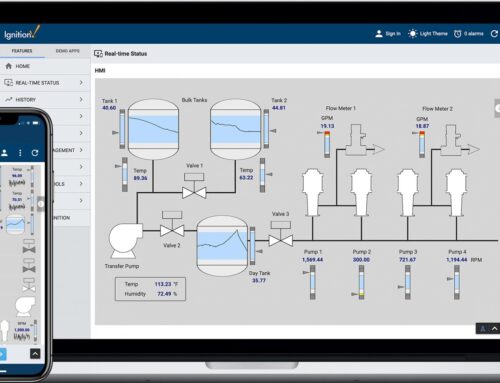In the ever-evolving world of manufacturing, the ability to monitor and optimize production processes is crucial. Enter the realm of CNC machines—Haas, Okuma, and Mazak—where precision meets innovation. however, the challenge lies not just in operating thes mechanical marvels, but in harnessing their data to drive efficiency and insight. This is where Ignition, the powerful industrial request platform, comes into play. Imagine transforming raw data into intuitive,real-time dashboards that illuminate every facet of your CNC operations. This article will guide you through the process of building these dynamic dashboards, bridging the gap between complex machinery and actionable intelligence. Whether you’re an engineer looking to streamline processes or a manager aiming to enhance productivity,this journey into the fusion of technology and manufacturing will equip you with the tools to revolutionize your workflow.
Understanding the Unique Requirements of Haas, Okuma, and Mazak CNCs
When developing dashboards for CNC machines such as those from haas, Okuma, and Mazak, it’s essential to recognize the distinct operational nuances and data protocols each brand employs. Haas CNCs are renowned for their user-friendly interfaces and integrated connectivity options, making data extraction relatively straightforward. however, they often require a deep understanding of their proprietary protocols to ensure seamless communication. In contrast, Okuma CNCs are celebrated for their robust, multitasking capabilities. They demand a more intricate approach to data handling, given their complex operational architecture. Mazak machines, known for their innovation and multitasking prowess, introduce additional layers of complexity with their advanced control systems, necessitating a customized approach to data integration and visualization.
To cater to these unique requirements, consider the following strategies when building dashboards in Ignition:
- Leverage Ignition’s scripting capabilities to create adaptable data models that accommodate the specific data formats of each CNC brand.
- Utilize WordPress CSS styling to ensure a visually cohesive and responsive dashboard layout that adapts to various devices and resolutions.
- Implement dynamic widgets to offer real-time insights and alerts tailored to the operational metrics most relevant to each CNC type.
- Incorporate user feedback loops to continuously refine and enhance the dashboard’s functionality,ensuring it meets the evolving needs of machine operators and technicians.
leveraging Ignitions Capabilities for Custom Dashboard Development
Incorporating Ignition’s versatile capabilities into your custom dashboard development can considerably enhance the operational efficiency of CNC machines such as Haas, Okuma, and Mazak. Leveraging the platform’s modular architecture, you can seamlessly integrate real-time data acquisition, allowing for dynamic visualization of machine metrics. Ignition provides a robust framework that supports a wide range of data sources,ensuring your dashboards are both thorough and responsive. By utilizing it’s powerful scripting and binding features, you can tailor dashboards to meet specific operational requirements, enabling operators to monitor performance metrics, track machine status, and predict maintenance needs effectively.
With Ignition, you can create intuitive interfaces that cater to the unique processes of each CNC brand. Utilize drag-and-drop components to build interactive elements such as:
- Customizable trend charts for analyzing machine performance over time.
- live data feeds that provide instant insights into operational parameters.
- Alert systems that notify users of critical issues in real-time.
Such features empower operators to make informed decisions, enhancing productivity and minimizing downtime. By exploiting ignition’s extensive library of widgets and its compatibility with third-party plugins, you can craft dashboards that not only meet but exceed the demands of modern manufacturing environments.
Best Practices for Data Integration and Real-Time Monitoring
Integrating data from Haas, Okuma, and Mazak CNCs into Ignition dashboards requires a strategic approach to ensure seamless data flow and real-time insights. Establishing a robust data pipeline is essential. This involves using reliable communication protocols like MTConnect or OPC UA to gather data from CNC machines. Ensure that data integrity is maintained by implementing validation checks and error handling mechanisms. additionally,utilize data normalization techniques to standardize data formats from different CNC models,which simplifies the integration process and enhances compatibility with Ignition’s data model.
Real-time monitoring is crucial for actionable insights, and effective data visualization plays a pivotal role. Craft intuitive dashboards by leveraging Ignition’s powerful visualization tools. Focus on creating dynamic layouts that allow users to customize their views and access critical metrics at a glance. Utilize color coding to highlight anomalies and trends, and integrate interactive elements such as drill-downs and tooltips for deeper analysis. Lastly, ensure dashboards are responsive and accessible across devices, utilizing WordPress CSS styling to maintain a consistent and professional appearance.
Optimizing User Experience with Intuitive Dashboard Design
Creating a seamless user experience in dashboard design is pivotal when working with complex CNC machines like Haas, Okuma, and Mazak. The goal is to provide operators with an interface that feels intuitive, reducing cognitive load and allowing them to focus on operating the machinery effectively. Understanding the user’s workflow is the first step in this process. By mapping out the tasks that users frequently perform, you can strategically place widgets and controls to ensure they are easily accessible. Consider using color coding and visual hierarchies to guide the user’s attention to the most critical data points. This not only helps in swift decision-making but also ensures a more efficient operation of the CNCs.
Incorporating responsive design elements can greatly enhance the usability of dashboards built in Ignition for these CNCs. This involves ensuring the dashboard adapts seamlessly across various devices and screen sizes, allowing operators to monitor and control processes whether they’re on the factory floor or in a remote location. Interactive charts and real-time feedback mechanisms can further elevate the user experience, providing operators with a dynamic interface that reflects the current state of operations.additionally, integrating customizable dashboards can empower users to tailor the interface to their specific needs, promoting a more personalized and efficient workflow. By focusing on these elements, you can create dashboards that not only meet the technical requirements of Haas, Okuma, and Mazak CNCs but also enhance the overall user experience.
Q&A
Q: What is Ignition, and why is it a good choice for building dashboards for CNC machines like Haas, Okuma, and Mazak?
A: Ignition is an industrial application platform designed for building custom HMI, SCADA, and IIoT solutions. It’s particularly suitable for CNC machines like Haas,Okuma,and Mazak due to its flexibility,scalability,and ability to connect seamlessly with various industrial devices. With Ignition, you can create real-time dashboards that provide valuable insights into machine operations, helping to optimize performance and increase efficiency.
Q: What are the first steps to get started with building dashboards in Ignition for these CNC machines?
A: Begin by ensuring that you have the necessary Ignition license and software installed. Next, identify the specific data points you want to monitor from your CNC machines. These could include metrics like spindle speed, feed rate, and cycle time. Establish communication with the CNC machines using appropriate protocols, such as OPC UA or Modbus, to pull this data into Ignition.
Q: How do I connect Haas, Okuma, and Mazak CNCs to Ignition?
A: Connecting these CNCs to Ignition involves setting up communication protocols. For Haas and Okuma machines, you might use MTConnect, which is a widely supported protocol for extracting data from CNC machines. Mazak machines frequently enough have proprietary interfaces, so you might need to use their specific API or a third-party solution that bridges the connection to Ignition. Once you have the data flowing,you can use Ignition’s Tag Browser to organize and manage the data points.
Q: What are some best practices for designing effective dashboards in Ignition for CNC monitoring?
A: when designing dashboards, focus on clarity and usability. Use intuitive layouts and prioritize the most critical facts. Incorporate visual elements like graphs, gauges, and color-coded indicators to quickly convey machine status and performance metrics. Ensure that the dashboard is responsive and accessible from various devices,enabling operators and managers to view it from anywhere. Regularly update and iterate on the dashboard based on user feedback and evolving needs.
Q: Can Ignition handle real-time data visualization, and how does it perform under heavy loads?
A: Yes, Ignition is built to handle real-time data visualization efficiently. Its architecture is designed for high performance, allowing it to process and display large amounts of data with minimal latency.However, to maintain optimal performance under heavy loads, it’s important to optimize your queries and scripts, manage resources effectively, and keep the Ignition server well-maintained.
Q: What are the potential challenges when building dashboards for CNCs in Ignition, and how can they be addressed?
A: Some challenges include establishing reliable data connections, managing data from multiple machine types, and ensuring data accuracy. To address these, ensure robust network infrastructure and use reliable communication protocols. Regularly test and validate the data being collected and displayed. Engage with the CNC manufacturers or community forums for support and best practices specific to each machine type.
Q: Are there any resources or communities you recommend for learning more about building dashboards in Ignition?
A: Absolutely! The Ignition Community Forum is a great place to connect with other users and find solutions to common problems. Additionally, Inductive Automation, the makers of Ignition, offer extensive documentation, training videos, and webinars. Online courses and tutorials on platforms like Udemy or LinkedIn Learning can also provide valuable insights and skills for building effective dashboards.
Wrapping Up
As we wrap up this exploration into the intricate world of building dashboards for Haas, Okuma, and mazak CNCs in Ignition, it’s clear that harnessing the full potential of these powerful tools can revolutionize how you monitor and optimize your manufacturing processes. With the right approach, your dashboards can become not just a window into your operations, but a dynamic tool that drives efficiency and innovation.
At Innorobix Automation, we are passionate about pushing the boundaries of what’s possible with industrial automation. whether you’re just begining your journey or looking to refine and expand your existing systems, we’re here to guide you every step of the way. Our team of experts is ready to collaborate with you, offering tailored solutions that meet the unique demands of your operations.
We invite you to reach out and discover how Innorobix Automation can empower your business with cutting-edge dashboard solutions.Let’s build a future where your CNC operations are as precise and efficient as the machines themselves. Connect with us today, and let’s turn your vision into reality.
















